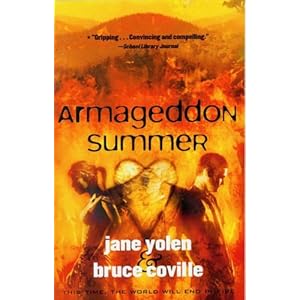I haven’t talked about Rebecca Stead’s book First Light yet, or M.T. Anderson’s The Game of Sunken Places, so that’s what I’ll devote this entry to. I really do have to get better about posting; I’m reading faster than I thought I could, and I have a lot of great books to catch you up on!
Okay, so First Light was Stead’s first published novel, and it is truly a remarkable work of what I would call subtle environmental science fiction. The story opens with the science fiction when a boy is exploring his mother’s drawing table; we are ‘educated’ right away to the fact that paper is scarce and valuable. And then the boy finds an envelope that has a color photo in it, something he has never seen before. So we are introduced to the notion of a protected society, much like the movie The Village, by M. Night Shyamalan. The next few chapters transport the reader to New York City and the point of view of one of the two main characters, Peter, who is 12 and the son of a professor / glaciologist (his dad) and a molecular biologist (his mom). Through the generosity of a philanthropist interested in global warming, his father is sent to Greenland to study the glaciers for six weeks, and Peter and his mother accompany him. The next main character (Thea) shows up when chapters three and four are told from her point of view. And guess where she lives? Not where you’d expect. Greenland, yes, but not in one of the cities, such as Nuuk, Paamiut, or Upernavik. Not even above ground. Thea has never seen the sun --- but she sure wants to.
The book is told, as you can imagine, from these two characters’ alternating points of view. I really like books written in this kind of format. The first book I read written this was The Martian Chronicles by Ray Bradbury. That was some time ago, but I remember appreciating getting the variety of points of view on a common theme / topic / plot. Granted, The Martian Chronicles was quite different; it was not limited to two characters’ points of view. But nevertheless, the idea persists for me.
Peter and Thea’s worlds end up colliding, and the journey to their meeting is nothing short of amazing. I am always impressed when a writer can create another world that is so credible, and First Light is no exception. Any society is unfailingly complex, and Stead has crafted the subtle details that embody Gracehope, where Thea lives, with extraordinary yet casual detail. The story has an underlying theme of global warming without being preachy; it gives just enough for young readers to make some connections to science issues and be able to have conversations and ask questions about environmental issues. At the same time, readers can have marvelous conversations about what they might take for granted about the society in which they move and breathe daily and what is considered ‘normal’ for different groups of people.
Something that sets this book apart is the way the special web site for it was constructed (http://www.firstlightbook.com/). It ‘scrolls’ to the side rather than up and down, as most web sites do. Along with the expected content (information about the book itself and the author), there are links for readers who become interested in how scientists work in Greenland, or some of the seemingly random mentions in the book that they might question. (Volkswagon testing sites? Really?) Check it out – you won’t be disappointed! I thoroughly enjoyed this book and can’t figure out why it didn’t also win an award, just like Stead’s second novel, When You Reach Me – more on that one later!
Okay, so I didn’t get to The Game of Sunken Places today; that one will be next, I promise! And what a wild book it is!











